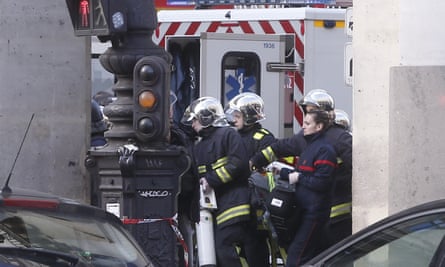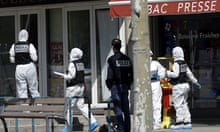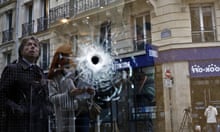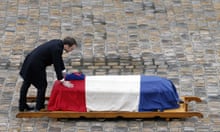A man who attempted a knife attack on soldiers guarding the Louvre Museum in Paris was shot and injured on Friday, highlighting France’s security and terror threat just three months before the French presidential election.
Hundreds of tourists were held in secure areas of the Louvre, one of the world’s most visited museums, after the man was shot five times by soldiers on patrol outside. Believed to be in his 30s, he struck at around 10am on a stairway in the Carrousel du Louvre, an underground shopping centre near the entrance to the museum. Wielding a knife, he ran at a group of soldiers on patrol shouting “Allahu Akbar”, or “God is greatest”.
The incident, in which one soldier was slightly injured, was described by the French prime minister, Bernard Cazeneuve, as “terrorist in nature”.
The suspect has not been formally identified but French police had established that the man was a 29-year-old Egyptian who arrived in France on 26 January after obtaining a tourist visa in Dubai, the Paris prosecutor said.
Police searched an apartment the man had rented in Paris and are now working to establish whether he acted alone, on impulse, or on orders from someone, prosecutor François Molins told a news conference. The man was wearing a black T-shirt with a death’s head emblem when he attacked soldiers checking bags near the museum’s shopping mall “with a machete in each hand”, Molins said.
He struck one soldier and knocked another one to the ground. When he continued his attacks the soldier on the ground shot him in the abdomen, Molins said.
Two rucksacks carried by the suspected attacker were checked by bomb disposal specialists at the scene and were found not to contain explosives.
Michel Cadot, the Paris police prefect, said the man had headed towards soldiers “armed with a machete” and shouting threats and “Allahu Akbar”. Soldiers opened fire and he was injured by gunshots, including to the stomach, and was being treated in hospital.
Cadot told reporters: “We are dealing with an attack from an individual who was clearly aggressive and represented a direct threat and whose comments lead us to believe that he wished to carry out a terrorist incident.“There was also a second individual who was behaving suspiciously, who has also been detained, but for now there does not appear to be a link between that individual and the attack.”
About 1,250 visitors in the Louvre were ushered to safe areas inside the museum for a time after the incident.
“There were announcements, then the security guards started running all over the place and, after a short period, they started gathering everybody up and getting them to one side of the building,” Lance Manus, 73, from Albany, New York, told Associated Press. “They pulled the shades. They didn’t want anybody to sit by the windows.”
Manus, in Paris with his wife, Wendy, to mark their 50th wedding anniversary, added: “I guess they were concerned that something would be coming from outside.” He said people in the museum were calm, but some young children were crying.
A woman who worked in a restaurant nearby told AFP: “We saw death coming for us, with everything that’s happening at the moment. We were very, very scared.”
The incident sparked fresh warnings from politicians about the terrorist and security threat, with France still reeling from a string of terrorist attacks that have killed more than 200 people over the past two years. France remains under a state of emergency following the Paris attacks of November 2015, which killed 130 people.

The French president, François Hollande, praised the soldiers, saying: “This operation undoubtedly prevented an attack whose terrorist nature leaves little doubt.”
Donald Trump responded to the incident in a tweet that described the suspected attacker as “a new radical Islamic terrorist”. “Tourists were locked down. France on edge again. GET SMART US,” the US president wrote.
The economy, immigration and security are major issues for voters in the two-round French presidential election in April and May. The country has shifted politically to the right after five years of the Socialist Hollande.
Polls show that Marine Le Pen, of the anti-immigration, far-right Front National, can reach the final round runoff. The rightwing candidate François Fillon, who has run a hardline campaign on security, immigration and Islam’s place in France, was once a favourite but is struggling for his political survival amid a scandal over whether he paid his wife and children out of public funds for allegedly fake jobs as parliamentary assistants.
The maverick independent Emmanuel Macron, who is running on a centrist ticket, is rising in the polls, and Benoît Hamon has seen a boost in support since he won the Socialist party primary last week.
Thousands of soldiers currently patrol cities, transport and landmarks across France as part of the Opération Sentinelle military defence operation put in place following the attacks on the magazine Charlie Hebdo and a Paris kosher supermarket in January 2015.
Several soldiers on patrol in France have been the target of attacks in recent years.
The Socialist MP Sébastien Pietrasanta, who co-authored a parliamentary report on France’s reaction to the terrorist threat, said military personnel and police officers were a particular target because they represented the French state. He told Associated Press that France was likely to be attacked again and “the worst has yet to come”. He said: “We are facing a persistent threat and instability will last for at least one generation.”
The fact that the incident happened outside the Louvre could worsen the crisis for the French tourism sector, which has suffered from a fall in visitors and bookings since the wave of attacks in France since 2015. Last year, visitor numbers to the Louvre fell 15% from 2015 to 7.3 million. The most recent major attack came last July, when a Tunisian man rammed a truck through crowds watching a Bastille Day fireworks display in Nice, killing 86 people.
The Louvre, a huge former royal palace in the heart of the city, is home to the Mona Lisa and other world famous works of art as well as a shopping centre and numerous exhibition spaces.







